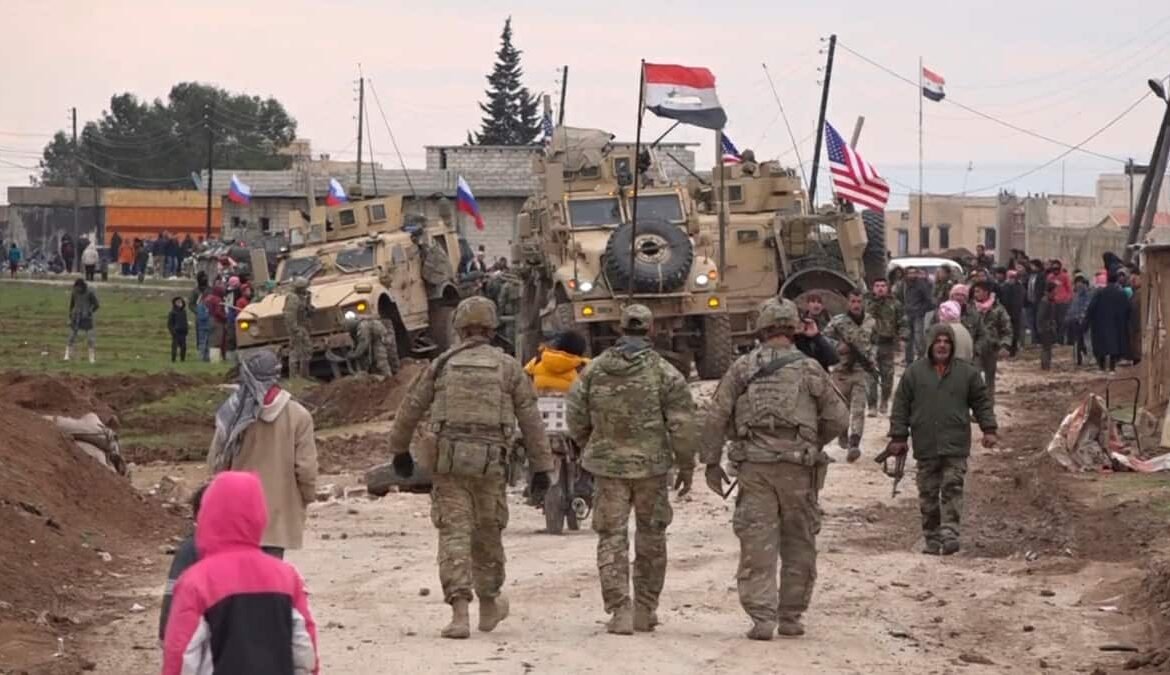Steven Sahiounie, journalist and political commentator
The battlefields in Syria lie silent, the US-NATO attack for regime change failed. But, in the northeast the conflict continues between the US occupation forces and those who are trying to oust them. Syria, Russia and their allies have a strategic plan to free the area of terrorists and communist separatists supported by the US.
In 2016, the US military invaded and occupied areas in the northeast of Syria. Currently, there are 900 US troops at 19 occupation posts in Syria, while the number of US security contractors there is unknown, but suspected to be sizeable. The US presence in Syria is under serious threat from many actors on the ground in an effort to drive out the US occupation in order to recover Idlib and the northeast. The freeing of civilians from terrorist domination, and ethnic cleansing depends on the removal of the US forces that support the occupation of Idlib and the northeast.
Russia and Iran are in Syria fighting Radical Islamic terrorists who have occupied Idlib. During the fight against ISIS, it was the Syrian Arab Army, and Russian airforce that fought to rid Syria of ISIS. The US government tries to sell a narrative that the US and Iraqi forces did it all and were the victors. Pentagon propaganda grinds out news that ISIS is still a threat in Syria. Experts point to the true story, that ISIS is a political ideology and its followers could be found anywhere, including Washington, DC.
Syria, Iran and Russia have a shared interest in the withdrawal of US occupation forces from Syria. The US support of the Kurdish separatists SDF and YPG are the reason for the Turkish occupation of parts of the northern border region of Syria; along with the Turkish support of the Radical Islamic terrorists group HTS who are occupying Idlib.
The US occupation of Syria prevents the freeing of 3 million civilians living under terrorist occupation in Idlib, and the removal of the Communist Kurdish occupiers who committed a massive ethnic cleansing of the northeast of Syria.
The US uses the threat of a ISIS resurgence to justify their occupation of Syria, which keeps families from returning to their own homes and farms. ISIS lost their last base of operation in Syria in March 2019.
Turkey, a NATO member and ally of the US, also wants the US military out of Syria, because President Erdogan regards the US supported SDF and YPJ as linked to the PKK, which has killed 30,000 people in Turkey over decades, and is a banned terrorist group. This has caused years of tension between the US and Turkey.
In early July, a Russian fighter jet flew close to American MQ-9 Reaper drones during a two-hour-long encounter.
The Qaim-Albukamal road is a key access route for cargo and passengers traveling on the international highway connecting the port of Latakia with Baghdad and Tehran. The US occupation forces control the free movement at the border crossing between Iraq and Syria. Iraqi officials have complained, but they are also suffering from the US occupation of troops which their Parliament voted to oust, but the US refused to go home.
Meanwhile, Israel claims they are fearful of an attack coordinated between Palestinian resistance groups, the Lebanese resistance group, and Iran. Israel will remain in fear until they negotiate a lasting and just peace with Palestine which will restore the human rights and dignity of the Palestinian people.
In March, the US carried out airstrikes in Syria killing at least eight resistance fighters in retaliation to prior drone attacks on US bases.
The US base at al-Tanf in October 2021 was targeted by a barrage of drones, which prompted a temporary evacuation. That base is protected by a Radical Islamic terrorist group called Mughawir al-Thawra. The group is supported by the US and serves as a security contractor for the base. They have a long history of smuggling and drug dealing which the US turns a blind-eye to.
Russian military pilots flew over the US occupation base at al-Tanf and bombed an unoccupied perimeter outpost last year. The US sent stealth F-22 fighter jets to the region in June.
Despite a de facto “deconfliction” arrangement with US forces, Russia seeks to expel US occupation forces to consolidate all of Syria under the central government administration, which would lead to the Turkish withdrawal of their occupation forces.
Raqqa, Syria’s seventh-largest city and the center of ISIS, was liberated in October 2017. The following September, the Kurdish-led Syrian Democratic Council declared the establishment of a statelet, the Autonomous Administration of North and East Syria (AANES).
Turkish President Erdogan is opposed to the Kurdish separatists and the US support of them. In 2016 Erdogan ordered an invasion into Syria to counter the threat of the Kurdish terrorists SDF and YPG on the Turkish border. Trump promised to pull out of Syria in a phone call with Erdogan in 2019, but the Pentagon would not allow Trump to fulfill his promise to their NATO ally.
On August 3, a Turkish drone strike on a car killed four members of the SDF and wounded two.
The F-35 deployment was first announced recently by the Pentagon as part of a package of forces heading to the region, including a destroyer and the USS Bataan amphibious assault ship with US Marines.
On July 23, a Russian Su-35 fighter unleashed flares that damaged a propeller blade on an American MQ-9 drone. On July 26, another Russian fighter damaged an American drone over Syria with flares,
A massive armed conflict is brewing on the east and west sides of the Euphrates River in eastern Syria. The US occupation forces and the Syrian Arab Army and its allies are the possible combatants. This conflict could spark a regional war, and there seems to be no peace plans on the drawing borad.
Steven Sahiounie is a two-time award-winning journalist



